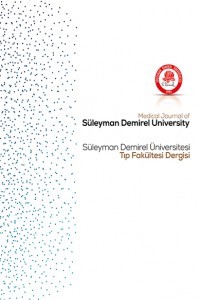SDÜTF ÖĞRETİM ÜYELERİNİN PROBLEME DAYALI ÖĞRENME KONUSUNDAKİ GÖRÜŞLERİNİN DEĞERLENDİRİLMESİ
Tıp Eğitimi, Eğitim Programı, Probleme Dayalı Öğrenme
EVALUATION OF SDUTF FACULTY MEMBERS’ VIEWS ABOUT POBLEM BASED LEARNING
Medical Education, Curriculum, Problem Based Learning,
___
- 1. Flexner A. Medical Education in the United States and Canada [Internet]. 1910 [cited 2018 Mar 12]. Available from: http://archive.carnegiefoundation.org/pdfs/elibrary/Carnegie_Flexner_Report.pdf
- 2. Universty MMP. Problem Based Learning (PBL) [Internet]. [cited 2018 Mar 29]. Available from: http://mdprogram.mcmaster.ca/mcmaster-md-program/overview/pbl---problem-based-learning
- 3. Camp G. Problem-Based Learning: A Paradigm Shift or a Passing Fad?*. MEO [Internet]. 1996 [cited 2018 Mar 29];1(1):2. Available from: https://www.cc-seas.columbia.edu/sites/dsa/files/PBL_Paradigm_or_Fad.pdf
- 4. Davis MH, Harden RM. AMEE Medical Education Guide No. 15: Problem-based learning: A practical guide. Med Teach. 1999;21(2):130–40.
- 5. Hemker HC. Critical Perceptions on Problem-based Learning. Adv Heal Sci Educ. 1998;3(1):71–6.
- 6. Kirschner PA, Sweller J, Clark RE. Why Minimal Guidance During Instruction Does Not Work: An Analysis of the Failure of Constructivist, Discovery, Problem-Based, Experiential, and Inquiry-Based Teaching. Educ Psychol. 2006 Jun;41(2):75–86.
- 7. Sweller J. Instructional design in technical areas. Camberwell, Australia: ACER Press.; 1999.
- 8. Wosinski J, Belcher AE, Dürrenberger Y, Allin AC, Stormacq C, Gerson L. Facilitating problem-based learning among undergraduate nursing students: A qualitative systematic review. Nurse Educ Today [Internet]. 2018;60(August 2017):67–74. Available from: https://doi.org/10.1016/j.nedt.2017.08.015
- 9. Donner RS, Bickley H. Problem-based learning in American medical education: an overview. Bull Med Libr Assoc. 1993;81(3):294–8. 10. Mahir BIBERÇI NB. PROBLEME DAYALI ÖĞRENME SURECİNE YÖNELİK NİTEL BİR DEĞERLENDİRME. Hasan Ali Yücel Eğitim Fakültesi Derg. 2012;17(2):12–33. 11. Ercan AKPINAR ÖE. Probleme Dayalı Öğrenme Yaklaşımına Yönelik Öğrenci Görüşleri. İnönü Üniversitesi Eğitim Fakültesi Derg [Internet]. 2005 [cited 2018 Oct 16];9. Available from: https://www.pegem.net/Akademi/3-8252-Probleme-Dayali-Ogrenme-Yaklasimina-Yonelik-Ogrenci-Gorusleri.aspx
- 12. Rowan CJ, Mccourt C, Bick D, Beake S. Problem based learning in midwifery-The teachers perspective. [cited 2018 Oct 17]; Available from: https://ac.els-cdn.com/S0260691706000505/1-s2.0-S0260691706000505-main.pdf?_tid=2c7f3b0d-04ba-4960-917d-57726f5c7d1f&acdnat=1539759546_c72bbc23400691823ec772eac0b1fce6
- 13. Sangestani G, Khatiban M. Comparison of problem-based learning and lecture-based learning in midwifery. Nurse Educ Today [Internet]. 2013;33(8):791–5. Available from: http://dx.doi.org/10.1016/j.nedt.2012.03.010
- 14. Beşer A MS ve SH. Probleme Dayalı Öğrenmede Eğitim Yönlendiricisi Nasıl Olmalı? Cumhur Üniversitesi Hemşirelik Yüksek Okulu Derg. 2004;8(2):32–8.
- 15. Gholami M, Moghadam PK, Mohammadipoor F, Tarahi MJ, Sak M, Toulabi T, et al. Comparing the effects of problem-based learning and the traditional lecture method on critical thinking skills and metacognitive awareness in nursing students in a critical care nursing course. Nurse Educ Today [Internet]. 2016;45:16–21. Available from: http://dx.doi.org/10.1016/j.nedt.2016.06.007
- ISSN: 1300-7416
- Yayın Aralığı: Yılda 4 Sayı
- Başlangıç: 2015
- Yayıncı: Süleyman Demirel Üniversitesi
Nonobstrüktif Azospermi Olgularında Yeni Yaklaşımlar
Murat Serkant ÜNAL, Mehmet Caner ÖZER
TARSAL TUNNEL SENDROMU TEDAVİ SEÇENEKLERİ VE CERRAHİ MÜDAHALE SONUÇLARININ İNCELENMESİ
Kemal ERTİLAV, Zeki Serdar ATAİZİ, Serdar ERCAN
Yüksel Uğur YARADILMIŞ, Mustafa Caner OKKAOĞLU, Hakan ŞEŞEN, Mahmut ÖZDEMİR, İsmail DEMİRKALE, Murat ALTAY
Çığır BİRAY AVCI, Bakiye GÖKER BAĞCA
Burcu BİTERGE-SÜT, Dilara Fatma BALI
Ekrem İSLAMOĞLU, Çağatay ÖZSOY, Kaan KARAMIK, İbrahim EROL, Mutlu ATEŞ, Murat SAVAŞ
Fetüslerde Nervus Fibularis Communis’in Terminal Motor Dallarının Giriş Noktaları
SDÜTF ÖĞRETİM ÜYELERİNİN PROBLEME DAYALI ÖĞRENME KONUSUNDAKİ GÖRÜŞLERİNİN DEĞERLENDİRİLMESİ
Giray KOLCU, Kevser VATANSEVER, Ayşenur BEYAZIT ÜÇGÜN, İbrahim TAMAM, Aysel BAŞER, Ahmet Nesimi KİŞİOĞLU
Üniversite öğrencilerinin beden imajı üzerine etkili sosyal baskılar var mı?
Fatma Selcen Çiftçi, Ersin Uskun
Menekşe Okşar, Şemsettin Okuyucu, Ertap Akoğlu, Sait Çolak, Selim Turhanoğlu
